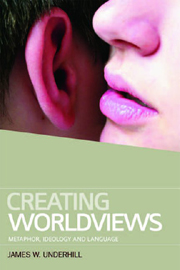Book contents
Introduction to Part II
from Part II - Case Studies in Metaphor
Published online by Cambridge University Press: 12 September 2012
Summary
The following three case studies will explore the relationship between speech and metaphor in the construction of ideological worldviews and in the very construction of our concept of language itself. In the first and second case studies, we will discuss the role played by metaphor in constructing ideological worldviews, or what we will increasingly call cultural mindsets. Two unfashionable mindsets have been selected deliberately, in order to upset readers and force them to leave behind their own convictions and concepts, and to enter into an unfamiliar and probably ‘unsavoury’ vision of the world. The first study will investigate the function of metaphor in constructing Czechoslovak communism. The second will investigate the Nazi worldview and the role metaphors play in what Viktor Klemperer has named Hitlerdeutsch.
The third case study will turn the methodology of the other two on its head: rather than studying the metaphors we find in language, we will consider the metaphors we use to construct our concept of ‘language’. Metaphoric models used to conceptualise French and English will be compared and contrasted within particular socio-historical situations. The study will then consider the ways in which lyrical ecological metaphoric paradigms are being used to defend the concept of linguistic diversity in recent scholarship in French and in English.
In all three of the case studies, the material we will be investigating should challenge readers and should force them to consider the ways in which perception and conception are affected by language at different levels.
- Type
- Chapter
- Information
- Creating WorldviewsMetaphor Ideology and Language, pp. 89 - 91Publisher: Edinburgh University PressPrint publication year: 2011

